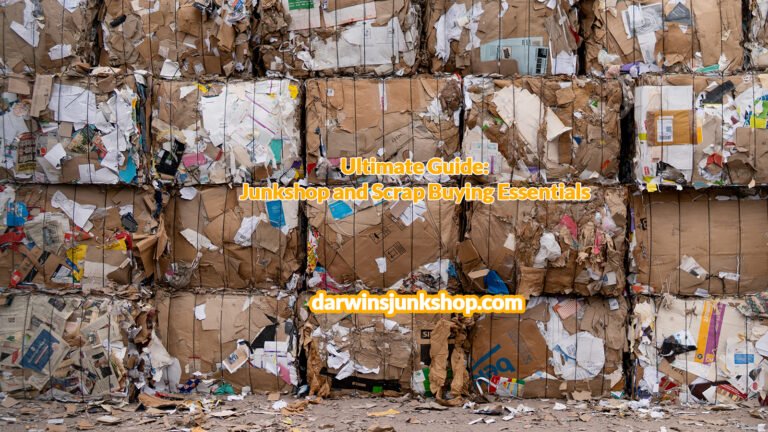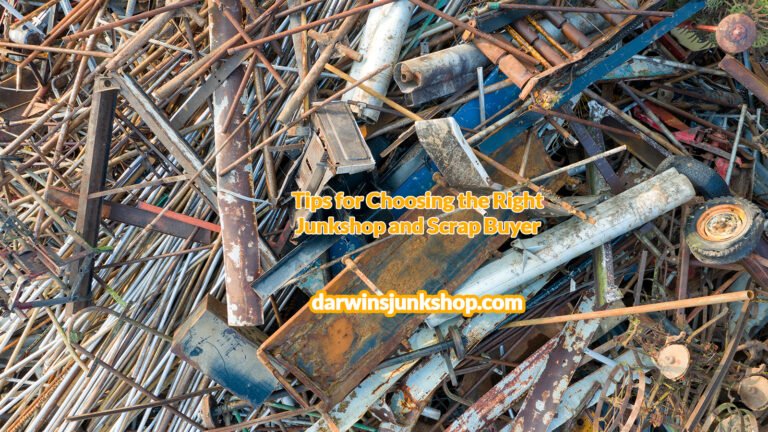Phone:
0939 601 4534
Physical address:
Kapilis, Subabasbas, Lapulapu City 6015

In every home, there’s a closet, attic, or basement filled with items that have long since lost their use. We call them ‘junk items’, but is that really all they are? This article delves into the world of unused possessions, exploring how and why we accumulate them. We’ll touch upon effective strategies to sort through stored belongings, and illustrate how these so-called ‘junk items’ can be repurposed or upcycled into something useful or even profitable. Lastly, we’ll show you how your unwanted goods can benefit others through selling or donating. As we journey through the realm of ‘junk’, you’ll discover that these items might not be as worthless as you think. So, buckle up and prepare for a treasure hunt, because it’s time to turn your trash into someone else’s treasure.
You’ve probably never realized, but those unused possessions gathering dust in your attic might be more valuable than you think, not only in monetary terms but also in their ability to evoke memories, emotions, and stories from the past. Often sentimentally priceless, these junk items can serve as tangible mementos of life’s milestones, cherished relationships, and personal history. More than just clutter, they represent a physical archive of your journey through life.
Furthermore, some of these items might actually be worth a surprising amount of money. Vintage toys, old coins, and antique furniture are just a few examples of items that can be surprisingly valuable. By selling these items, you could potentially generate extra income. Thus, it is worth taking the time to assess the value of your unused possessions.
Isn’t it fascinating how we often find ourselves drowning in a sea of unused possessions? The reasons for accumulating unwanted goods are numerous. One reason can be sentimental attachment. Some items remind us of loved ones or special moments, and we can’t bear to part with them. Other times, it’s due to the perceived future utility; we keep things thinking we might need them someday. A lack of time or energy to sort and declutter often leads to accumulation, as well. Moreover, our consumerist culture encourages buying more than we need, leading us to acquire goods we rarely use. Lastly, fear of waste or regret can also play a part; we hesitate to throw away items because we might regret it later. Thus, various emotional and practical factors contribute to the piling up of unwanted goods.
Feeling overwhelmed by mountains of stored belongings? Here’s a tip: start small. Tackle one drawer, one shelf, or one box at a time to prevent burnout. Mark three boxes as ‘keep’, ‘donate’, and ‘discard’, and sort items accordingly. Items that haven’t been used in over a year, duplicates, or things that no longer spark joy, should be re-evaluated for their necessity.
Use the ‘one in, one out’ rule for new acquisitions to stop clutter from accumulating. Take breaks when needed, but be consistent and patient. It’s not a race, but a journey to a clutter-free living space. Remember, removing unwanted items can be liberating and therapeutic, allowing you to reclaim your home from the clutches of junk.
Once you’ve decluttered your space, don’t be too hasty to discard everything; there’s a world of creative possibilities in repurposing or upcycling your old goods. Old clothes, for instance, can be turned into fashionable tote bags or quirky pillows. Wooden pallets may be transformed into rustic coffee tables or wall-mounted wine racks. Jars and bottles, with a touch of paint, become stylish vases or organizers. Even old ladders can have a second chance as a bookshelf or towel rack. Remember, with a bit of creativity and effort, items that seem like junk can become beautiful and functional pieces. So, before you throw something away, consider its potential and you may find yourself saving money and reducing waste at the same time.
Don’t forget, you’ve also got the option to sell or donate your unwelcome goods; it is a great way to pocket a little extra cash or help out a worthy cause. Selling your items can be done through online platforms such as eBay, Craigslist, or Facebook Marketplace. Label your items accurately and price them fairly to attract potential buyers. On the other hand, donating to charity shops like Goodwill or The Salvation Army can be a noble route. These organizations often sell donated items to raise funds for their causes. Additionally, many offer tax deductions for your donations. By selling or donating your unwanted goods, you are not only decluttering your space, but also making a positive impact on your wallet or community.
Living in a cluttered space can lead to increased stress, anxiety, and depression. It might also decrease productivity, hinder relaxation, and make it difficult to focus, negatively impacting overall mental well-being.
Overcoming emotional attachment to unused possessions involves recognizing the emotional value, appreciating the memories, then letting go. It is about understanding that memories reside in the mind, not in the object. Regular decluttering can also help.
Improper disposal of items can lead to severe environmental concerns such as soil, water, and air pollution. It may also cause harm to wildlife and contribute to health problems in humans due to toxic leaching.
Teaching children about avoiding hoarding can begin with conversations about the value of decluttering. Encourage them to donate or recycle their unused items, emphasizing the positive impact on space and mental clarity.
One can craft unique wall art using old magazines or newspapers. Alternatively, transform worn-out clothes into vibrant patchwork quilts, or repurpose broken ceramics into mosaic designs for table tops or flower pots.
So, don’t let your unused stuff collect dust. Understand their value, sort them out, and decide whether to repurpose, sell, or donate. There’s potential in your old goods, whether it’s for profit, charity, or maybe just to bring a little joy into someone else’s life. Remember, one person’s trash might be another’s treasure!

In the bustling city of Lapu-Lapu, a small yet significant movement towards environmental sustainability has been steadily growing. At the heart of this movement are the local junkshops, unrecognized heroes of waste management. These establishments not only provide a livelihood…

Are you tired of the daily grind and looking for a new, exciting hobby that has the potential to put some extra cash in your pocket? Look no further! Junkshop and scrap buying is not only a fun and adventurous…

In today’s world, recycling and proper waste disposal are essential for preserving our environment. One effective way to contribute to this cause is by selling your scrap materials to a junkshop or scrap buyer. However, with so many options available,…